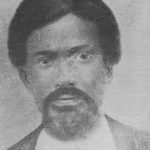THE HISTORY OF MATTHEW GAINES
 Matthew Gaines, born August 4, 1840, was a Baptist minister who served as the senator from the 16th District in the Texas Legislature during Reconstruction. During his tenure in office, he was a staunch advocate for the rights of freed people.
Matthew Gaines, born August 4, 1840, was a Baptist minister who served as the senator from the 16th District in the Texas Legislature during Reconstruction. During his tenure in office, he was a staunch advocate for the rights of freed people.
Born into slavery on a plantation in Pineville, Louisiana, he learned to read by candlelight from books smuggled to him by a boy who lived on the same plantation. Gaines escaped to freedom twice but each time was caught and returned to slavery. His first escape came after 1850, when he was sold to a man from Louisiana and was subsequently hired out as a laborer on a steamboat. Using a false pass, he escaped to Camden, Arkansas.
In Burton, Washington County, Gaines established himself as a leader of the black community, both as a minister and politician. He passionately and unflaggingly supported the forward movement that established the first public school system for all Texans.
The first African-American state senator from Washington County, his leadership was instrumental in assisting the 12th Texas Legislature with taking full advantage of the Land-Grant College Act of 1862, also known as the Morrill Act, which created the Agricultural and Mechanical College of Texas, now Texas A&M University.
The Morrill Act granted revenues from the sale of millions of acres of federal lands to states to create higher education institutions that emphasized agriculture and mechanical arts. The act provided opportunities to thousands of farmers and working people who were previously excluded from higher education.
“The legacy of Matthew Gaines is intertwined with the founding of Texas A&M University. To myself and other members of my community, this initiative to recognize him on campus is an acknowledgement of the tenacity of a man who personified the Aggie core values. It is these core values that bind us together, even in the face of a world of differences.”
Gentill Abdulla '19, Black Student Alliance Council
“Senator Gaines was a firm supporter of education and worked tirelessly to pass legislation that enabled Texas to take advantage of the Morrill Land-Grant Act, an act of Congress that provided grants of land to states to finance the establishment of colleges specializing in ‘agriculture and the mechanic arts’.”
Matthew Gaines Statue Commemoration Bill, Student Senate Bill 70-10
Texas A&M University | November 2, 2017
Gaines was a vigilant guardian of the rights and interests of African Americans. Among the many issues he addressed were education, prison reform, the protection of blacks at the polls, the election of blacks to public office, and tenant-farming reform.
To encourage educational and religious groups to work toward educational improvement in their communities, Gaines sponsored a bill that called for exempting such organizations from taxation. Buildings and equipment used for charitable or literary associations were also exempted; the bill became law on June 12, 1871.
Gaines was elected to a six-year term to the Texas Senate, but served only four years because his seat was challenged in 1873 when he was convicted on the charge of bigamy, which was never proven, and he subsequently relinquished his post. The charge was overturned on appeal, and he was reelected, but the Democratic and white majority seated his opponent. Gaines continued to be active in politics and made his political views known in conventions, public gatherings, and from his pulpit.
Matthew Gaines died in Giddings, Texas, on June 11, 1900. The legacy of Matthew Gaines is intertwined with the founding of Texas A&M University.
Sources: Cushings Library and Texas State Library and Archives Commission.

